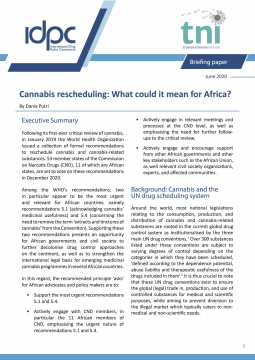Publications
Cannabis and Climate
- Details
- Written by Tom Blickman
- Hits: 14834
 Environmental impacts are rarely taken into account in the cannabis regulation debate. The assumption is that legal regulation would automatically reduce the negative environmental consequences of the unregulated illegal market, because authorities would compel the industry to comply with basic environmental standards. Practices in North America and the direction of the emerging regulation debate in Germany and other European countries, however, reveal a disturbing trend towards indoor cannabis cultivation. The high carbon footprint of indoor grow facilities could jeopardize policy aims to reduce energy use and to meet climate goals.
Environmental impacts are rarely taken into account in the cannabis regulation debate. The assumption is that legal regulation would automatically reduce the negative environmental consequences of the unregulated illegal market, because authorities would compel the industry to comply with basic environmental standards. Practices in North America and the direction of the emerging regulation debate in Germany and other European countries, however, reveal a disturbing trend towards indoor cannabis cultivation. The high carbon footprint of indoor grow facilities could jeopardize policy aims to reduce energy use and to meet climate goals.
 Download the brief (PDF)
Download the brief (PDF)
Prohibited Plants
- Details
- Written by Tom Blickman
- Hits: 13565
 Across the world, the state of environmental stress is unprecedented. As scholarship and activism on ‘environmental justice’ points out, poorer and marginalised communities face particular exposure to environmental harms. This holds particularly true for populations in the global South. The role of illicit drugs in relation to these environmental stresses is an underexplored terrain. Yet, as this report will argue, drugs, as well as the policy responses to them, are an environmental issue.
Across the world, the state of environmental stress is unprecedented. As scholarship and activism on ‘environmental justice’ points out, poorer and marginalised communities face particular exposure to environmental harms. This holds particularly true for populations in the global South. The role of illicit drugs in relation to these environmental stresses is an underexplored terrain. Yet, as this report will argue, drugs, as well as the policy responses to them, are an environmental issue.
 Download the report (PDF)
Download the report (PDF)
Cannabis Regulation and Development
- Details
- Written by Tom Blickman
- Hits: 28282
 Significant policy shifts have led to an unprecedented boom in medical cannabis markets, while a growing number of countries are moving towards the legal regulation of adult non-medical use. This trend is likely to bring a range of benefits. Yet there are growing concerns over the many for-profit cannabis companies from the global North that are aggressively competing to capture the licit spaces now opening in the multibillion-dollar global cannabis market. This threatens to push small-scale traditional farmers from the global South out of the emerging legal markets.
Significant policy shifts have led to an unprecedented boom in medical cannabis markets, while a growing number of countries are moving towards the legal regulation of adult non-medical use. This trend is likely to bring a range of benefits. Yet there are growing concerns over the many for-profit cannabis companies from the global North that are aggressively competing to capture the licit spaces now opening in the multibillion-dollar global cannabis market. This threatens to push small-scale traditional farmers from the global South out of the emerging legal markets.
A Sustainable Future for Cannabis Farmers
- Details
- Written by Tom Blickman
- Hits: 29589
 Learn how lessening the barriers for small farmers while raising them for large companies can help to steer legal cannabis markets in a more sustainable and equitable direction based on principles of community empowerment, social justice, fair(er) trade and sustainable development.
Learn how lessening the barriers for small farmers while raising them for large companies can help to steer legal cannabis markets in a more sustainable and equitable direction based on principles of community empowerment, social justice, fair(er) trade and sustainable development.
 Download the report (PDF)
Download the report (PDF)
Cannabis rescheduling
- Details
- Written by Tom Blickman
- Hits: 22984
 In January 2019 the World Health Organization issued a collection of formal recommendations to reschedule cannabis and cannabis-related substances, these present an opportunity for African governments and civil society to further decolonise drug control approaches on the continent, as well as to strengthen the international legal basis for emerging medicinal cannabis programmes in several African countries.
In January 2019 the World Health Organization issued a collection of formal recommendations to reschedule cannabis and cannabis-related substances, these present an opportunity for African governments and civil society to further decolonise drug control approaches on the continent, as well as to strengthen the international legal basis for emerging medicinal cannabis programmes in several African countries.
 Download the briefing (PDF)
Download the briefing (PDF)
Subcategories
Legislative Reform Series Article Count: 28
The Series on Legislative Reform of Drug Policies aims to stimulate the debate around legislative reforms by highlighting good practices and lessons learned in areas such as decriminalization, proportionality of sentences, specific harm reduction measures, alternatives to incarceration, and scheduling criteria for different substances. It also aims to encourage a constructive dialogue amongst policy makers, multilateral agencies and civil society in order to shape evidence-based policies that are grounded in the principles of human rights, public health and harm reduction.
The Human Face Article Count: 6
These videos feature people who have spent years in prison enduring harsh sentences that are disproportionate to the crimes they committed. The videos are part of a TNI/WOLA study investigating the prison systems of eight countries in Latin America. The people in the videos are featured because they represent the rarely revealed human side of the war on drugs. These personal stories illustrate the unjust impact of current drug laws.




